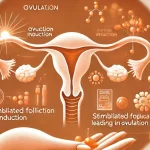As childbirth specialists, we understand how exciting, but also nerve-wracking, the run-up to the birth of your baby can be. Whether you are expecting your first child or have already become a mother, every birth is unique and brings new questions and concerns. One of the topics that many expectant parents have to deal with is inducing labor. What exactly happens during an introduction? When is it chosen? And what can you expect?
Why is labor induced?
There are several situations in which it may be necessary to induce labor. First of all, medical reasons often play a major role in this. Consider complications such as: gestational diabetes, high blood pressure or if the pregnancy lasts longer than 42 weeks. In these cases it may be safer for both mother and baby to stimulate labor. In addition, there are also non-medical reasons, such as personal circumstances or wanting to avoid certain dates, that may cause a doctor or midwife to decide to initiate the procedure. Although an introduction is usually based on medical indications, personal preferences can also play a role.
Before a decision is made about induction, we will... Midwives Lelystad Always do a thorough assessment and discuss the options with you. We usually start with less invasive methods to induce labor. Here are some methods we can apply:
-
- Stripping: An attempt is made to loosen the membranes from the uterine wall.
-
- Use of medications: Medicines such as oxytocin can be administered via an IV.
-
- Mechanical ways: Such as placing a balloon catheter.
-
- Rupture of the membranes: This is also called amniotomy.
Our main priority is always your health and that of your baby. We strive for the most natural course of labor as possible, but sometimes a little help is unavoidable and necessary. With your well-being in mind, we make the most well-considered decision together.
| Rode | What to do |
|---|---|
| Gestational diabetes | Hormonal introduction |
| 42+ weeks pregnant | Breaking of the membranes |
| High blood pressure | Oxytocin via IV |
Preparation
-
- Comfortable clothing
-
- Toiletries
-
- Your birth plan
-
- Identification
-
- Telephone numbers of necessary contacts
In addition, it is essential to... mentally prepare. Take the time to relax and make sure you have enough rest in the days before the planned introduction. Read informative literature about the different phases of labor. Do you have any specific questions about the process? Do not hesitate to discuss this with your midwife. They can provide you with practical tips and emotional support.
| What to do | Why |
|---|---|
| Practice relaxation techniques | Reduces stress and anxiety |
| Have a contact person ready | For emergencies or questions |
When is an introduction possible?
An induction can be considered in different situations. Sometimes it can be safer for mother and child to start labor artificially than to wait for the natural start. This happens, for example, with medical indications such as high blood pressure, diabetes or if there are complications with the placenta. An induction may also be advised if you about time usually after 41 or 42 weeks of pregnancy. In some cases, the expectant mother may opt for an introduction for personal or psychological reasons.
The circumstances surrounding an introduction can vary greatly. Here are some common reasons:
-
- Medical reasons: High blood pressure, gestational diabetes, preeclampsia.
-
- About time: Pregnancy longer than 41-42 weeks.
-
- Personal preference: Anxiety, previous traumatic births.
Our approach at Midwives Lelystad varies per situation, but always with a view to the best experience for mother and child. For example, we can use:
| Methods | Examples |
|---|---|
| Medicinal | Prostaglandins, oxytocin drips |
| Mechanical | Balloon catheter |
| Naturally | Stripping the membranes |
If the uterine mouth is immature
| Method | Description | Advantages |
|---|---|---|
| Prostaglandins | Medications that are applied locally | Provide softening and maturation |
| Balloon catheter | A balloon that is placed in the cervix | Physical pressure to open the cervix |
Often these methods will gradual work to prepare the uterine mouth for natural growth contractions. However, this does not mean that it always produces immediate results; it may sometimes require multiple applications or adjustments. In addition, these methods are always checked by your midwife to ensure that mother and child are in good health. best health stay.
Methods to ripen the cervix
| Method | Advantages | Cons |
|---|---|---|
| Hormonal gels | Effective, fast | May have side effects |
| Balloon catheter | No hormones | Can be uncomfortable |
| Natural techniques | Few side effects | Uncertain result |
Induction of labor
While the thought of it may seem daunting, it is often a gentle process that can go smoothly. We will guide you step by step through every part of the procedure. This keeps you informed of what to expect. For example, we use gel or pills to stimulate your body. Sometimes an adjustment in your daily routine is enough to give your body a boost. Only if it is really necessary do we use an IV to induce contractions.
Common Methods
- Gel method
- Internal balloons
- Medical drip
- Natural stimulation
Types of Medication
| Medication | Usage |
|---|---|
| Prostaglandin | Softening the cervix |
| Oxytocin | Induction of contractions |
How does the delivery proceed?
During an induced labor there are several steps and techniques that we can use to help the labor progress. We often start with the ripening of the cervix, where prostaglandin gel or tablets can be introduced. Another method is it artificial rupture of the membranes. During these processes we closely monitor the health of the mother and the baby. Sometimes it is necessary to oxytocin via an IV to make the contractions more powerful and regular.
In additionwe cana balloon catheter use to help open the cervix. This catheter is gently inserted and inflated with sterile water, which puts pressure on the cervix and gradually opens it. It may also be helpful to change position and move regularly to promote labor. Below is an overview of possible methods:
-
- Prostaglandin gel – For ripening the cervix
-
- Artificial rupture of the membranes – To initiate labor
-
- Oxytocin – To stimulate strong and regular contractions
-
- Balloon catheter – To allow the cervix to open naturally
| Methods | Advantages | Suitable for |
|---|---|---|
| Prostaglandin gel | Gently stimulates maturation | Birth planning |
| Artificial rupture of the membranes | Faster contractions actions | Tracking term babies |
| Oxytocin | Strong contractions | Slow start |
| Balloon catheter | Minimal medical intervention | Tender cervix |
After the birth
Here are some tips to make the first few days as smooth as possible:
-
- Hydration: Make sure you drink enough to stay hydrated.
-
- Power supply: Try to eat nutritiously. Foods rich in iron can aid recovery.
-
- Peace: Get plenty of rest and sleep when your baby is sleeping.
| Expected | Additional benefit |
|---|---|
| Aftereffects | Helps to shrink the uterus |
| Childbirth tears | Emotional relief |
| Blood loss | Normal and part of recovery |
At Midwives Lelystad we are ready to support you during this "crucial" time. If you have any questions, please do not hesitate to contact us. We're here to help and guide you through every step of the process, so that your new beginning is as pure and perfect as possible.
Who will be present at the birth?
-
- Midwife: This professional is essential for thedeliveryand will supervise all medical steps.
-
- Partner: Provides emotional support and helps you feel at ease.
-
- Relatives or friends: Forms an additional support system and offers practical help.
Some women choose to hire a doula. Although not medically trained, a doula can be extremely supportive. It may also happen that you encounter an intern during your delivery. This is always completely voluntary and you can indicate at any time if you prefer not to do so.
| Person | Role | Benefit |
|---|---|---|
| Midwife | Medical supervision | Safety |
| Partner | Emotional support | Familiarity |
| Doula | Support | Extra Comfort |
Risks and complications
Although induction of labor is often a wise choice for the health of mother and child, it carries some risks and complications. For example, induction can lead to hyperstimulation of the uterus, meaning that the contractions are too strong and too frequent. This can result in reduced oxygen supply to the baby. In addition, there is a chance that intervention, such as an emergency caesarean section, will become necessary. In addition, childbirth can sometimes take longer than a spontaneous birth, which can cause extra stress and fatigue.
In addition to the risks mentioned earlier, there are also less common complications to consider. An infection sometimes occurs when the waters break prematurely. In addition, a ruptured uterus can be a potential danger, especially in women who have previously had a cesarean section have had. In addition, anesthesia can sometimes have unwanted side effects, such as nausea or headaches. That's why it's essential to be well prepared and discuss all the pros and cons with your midwife.
| Risk | Frequency | Comments |
|---|---|---|
| Hyperstimulation | Average | Can lead to reduced oxygen supply |
| Prolonged labor | Often | More intense and tiring |
| Infection | Seldom | Possible if the membranes break early |
| Ruptured uterus | Seldom | Possibly after previous caesarean section |
Conclusion
Thank you for reading our article “Everything you need to know about induction of labor”! We hope that you now have a good idea of what this procedure entails and what you can expect. At Midwives Lelystad we are always ready to support you and answer all your questions. Or you Are you pregnant now or know someone who is expecting, feel free to contact us. We're always happy to share our knowledge and experience to ensure you feel as relaxed and prepared as possible. See you soon at Midwives Lelystad!








